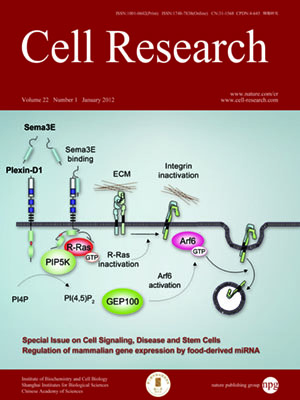
Volume 22, No 1, Jan 2012
ISSN: 1001-0602
EISSN: 1748-7838 2018
impact factor 17.848*
(Clarivate Analytics, 2019)
Volume 22 Issue 1, January 2012: 155-167
ORIGINAL ARTICLES
Oct4 links multiple epigenetic pathways to the pluripotency network
Junjun Ding1, Huilei Xu2,*, Francesco Faiola1,*, Avi Ma'ayan2 and Jianlong Wang1
1Department of Developmental and Regenerative Biology, Black Family Stem Cell Institute, Mount Sinai School of Medicine, New York, NY 10029, USA
2Department of Pharmacology and Systems Therapeutics, Mount Sinai School of Medicine, New York, NY 10029, USA
Correspondence: Jianlong Wang,(jianlong.wang@mssm.edu)
Oct4 is a well-known transcription factor that plays fundamental roles in stem cell self-renewal, pluripotency, and somatic cell reprogramming. However, limited information is available on Oct4-associated protein complexes and their intrinsic protein-protein interactions that dictate Oct4's critical regulatory activities. Here we employed an improved affinity purification approach combined with mass spectrometry to purify Oct4 protein complexes in mouse embryonic stem cells (mESCs), and discovered many novel Oct4 partners important for self-renewal and pluripotency of mESCs. Notably, we found that Oct4 is associated with multiple chromatin-modifying complexes with documented as well as newly proved functional significance in stem cell maintenance and somatic cell reprogramming. Our study establishes a solid biochemical basis for genetic and epigenetic regulation of stem cell pluripotency and provides a framework for exploring alternative factor-based reprogramming strategies.
Cell Research (2012) 22:155-167. doi:10.1038/cr.2011.179; published online 15 November 2011
FULL TEXT | PDF
Browse 2408


